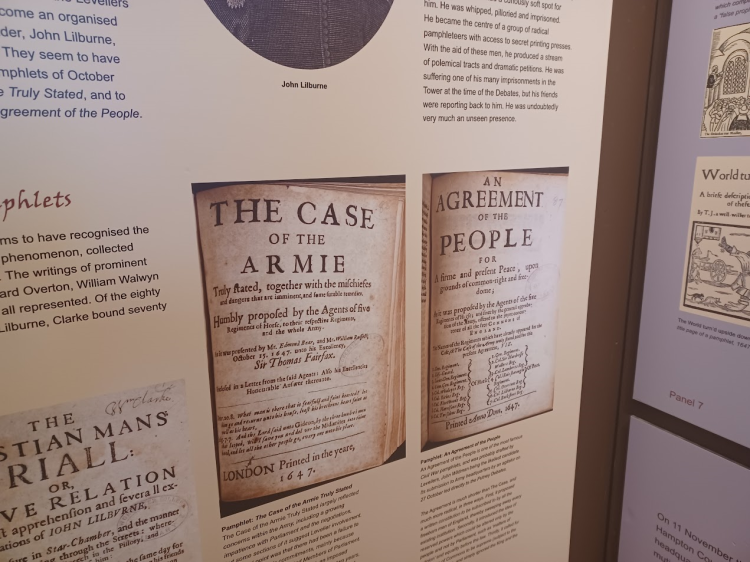The Leveller’s and the mutinies. Curious as to whether there’s a battle to propose to Class Wargames, as a result of further thinking beyond my comments here.. It seems there was. Here are my notes which focus more on the politics now, rather than the military actions.
History
- https://libcom.org/history/1642-1652-diggers-levellers
- http://bcw-project.org/military/third-civil-war/leveller-mutinies, deals with the battles as they were
- https://en.wikipedia.org/wiki/Banbury_mutiny
In September 2022, I went to the site of the Putney Debates and then found these links
- Levellers, on wikipeda
- Americans and the-english-civil-war, a review of US written fiction about americans and the ECW, mentions that several of the so-called regicides fled to America.
- Thomas Rainsborough, whose words on democracy still reverberate today.
…the poorest he that is in England hath a life to live, as the greatest he; and therefore truly, Sir, I think it’s clear, that any man who is to live under a government ought first by his own consent put himself under that government; and…the poorest man in England is not bound…to that government he hath not had a voice to put himself under…
Although it seems that when they said the poorest, they didn’t mean wage earners which is why until the 20th century voting in the UK was restricted to [male] property owners.
I comment further on both the Battle of Burford/Banbury Mutiny and the potential gaming of it at “Class Wargames & the ECW“, elsewhere on this wiki. The wikipedia article also mentions the Corkbush Field mutiny which is where the Levellers were disarmed.
From the libcom article, I find this, an Agreement of the People drawn up by a committee of Levellers including John Lilburne which was to have been discussed at a meeting of the commonwealth armies at Newmarket in June 1647. There were several versions and from the libcom article, in brief this is what they asked for:
- Power to be vested in the people
- One year Parliaments, elected by equal numbers of voters per seat. The right to vote for all men who worked independently for their living and all those who had fought for the Parliamentary cause
- Recall of any or all of their MPs by their electors at any time
- Abolition of the House of Lords
- Democratic election of army officers
- Complete religious toleration and the abolition of tithes and tolls
- Justices to be elected; law courts to be local and proceedings to be in English [not French!]
- Redistribution of seized land to the common people
I was pointed at John Rees’s The Leveller Revolution
I went to a video lecture given by the Cromwell Museum on the Levellers.
My notes,
- The manifesto can be summed up as a need for a fairer parliament, and inalienable, irrevocable basic rights; this was an alternate parliament, the Army speakers were delegates from their regiments. Dual Power if you like.
- The invasion of Ireland was extremely unpopular within the Army. This I think is relevant.
- The argument on the franchise, reduced to popular sovereignty vs the property qualification. (There is a fab quote on the fact that poor people will use their vote to take the wealth from the rich).
- The Army had lost confidence in both the King and Parliament. Cromwell (and the Parliament) wanted a deal with the King; the Levellers and the Army did not. It seems that Putney pushed Cromwell towards both an anti-monarchy and anti-parliamentty position, leading to Pride’s Purge and then the trial and execution of the King.
- Rees stares that Cromwell was a procrastinator
- There was a significant New England influence, the lessons of self government without aristocracy influencing the radicals. Also the influence of the Dutch republic(s).
- Rees answered my question on whether the English Revolution was a successor to the Peasants Revolt, the John Ball riots and the reformation by saying it was different and an original, seismic event, as a result of the evolving of a modern society, the death of feudalism, the growth of pre-capitalist industry and the development of political organisations and ideologies. He says the dominance of London in the UK and the development of communications made a difference too. I am not convinced. London has always been important to the politics of England.
In Oct 2022, I went to visit the place of the Putney Debates. I took this picture, and bought their DVD, with a short piece talking about the debates with voice overs from local MPs and a second longer piece with a panel discussion chaired by Geoffrey Robinson, with contributions from Tony Benn, Tristan Hunt and Shami Chakrabarthi.
I think these are the two manifestos, from the other ranks, the agitators and the leadership, the grandees.

It seems Trotsky was interested and wrote about the ECW, the early embourgoisification of England and the failure of the Levellers. In my post, early English revolutionary spirit I examine the early development of democratic demands, not sure Trotsky was right on the inevitability of failure of Levellers.
I edited the following content; as I refactored the page to be about the history and less about the war gaming. “With respect to gaming the Battle of Burford, the Reds vs. Reds rules might be appropriate, with a small adjustment. The levellers get to stop a rout by the reading of their manifesto for instance. (I comment further on both the Battle and the potential gaming of it at “Class Wargames & the ECW“, elsewhere on this wiki. The wikipedia article also mentions the Corkbush Field mutiny which is where the Levellers were disarmed.”
I added my comments on John Rees’s lecture.